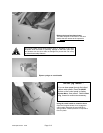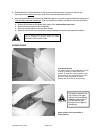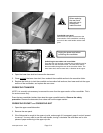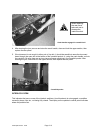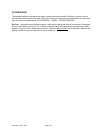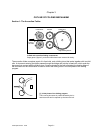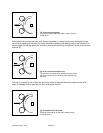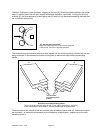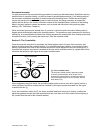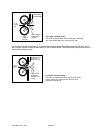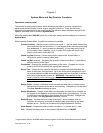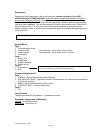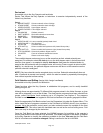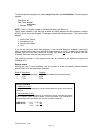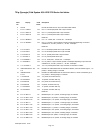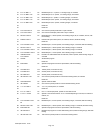
2750 op#3 R3.doc 10-02 Page 3-4
Document inversion
For most documents the accordion folding procedure is exactly as described above. (Bookfolds require a
modified form of accordion folding.) In the first phase of the standard procedure [1], the leading edge of
the document is deflected downward
to make contact with the folding drum. Certain document types
require the document to be deflected upward in the first phase, this being necessary to present the
packet with title block in the correct orientation relative to the crossfold blades. Inversion of the leading
edge in this way applies to certain documents, such as those with title block trailing and long edge
leading (“LEL” orientation, Chapter 4).
Other document types require another form of inversion in which the entire accordion folded packet is
flipped upside down before entering the crossfold section. This procedure, again necessary for title block
positioning, is accomplished at the end of the folding sequence by reversing the drum through one almost
complete revolution, thus inverting the packet as it exits the accordion folder.
Section 2: The Crossfolder
Once the accordion sequence is completed, the folded packet exits to the rear of the accordion fold
section and then enters the crossfold section. If no crossfold has been called for, the accordion folded
packet is propelled to the rear of the crossfold section and is then ejected into the rear receiving tray. If
crossfolds are required, the packet is arrested at the rear of the crossfold section by a guide fence which
maintains the packet at right angles to the upper crossfold blade.
Upper
crossfold
fold
rolls
Upper crossfold blade
Accordion
folded packet
Packet shifts
left-right
When stopped by the guide fence, the accordion folded packet is driven from left to right to position it
under the blade, which then makes the first crossfold by driving the packet downward into the upper
crossfold fold rolls [1].
If only one crossfold is called for [2], the lower crossfold blade acts simply as a diverter, pushing the
descending packet through the lower crossfold fold rolls, and then out to the crossfold receiving tray at
left (viewed from the rear of the crossfold section).
[1] First crossfold action
The accordion-folded packet is precisely located
under the crossfold blade, which is then “fired”
downward by solenoid action. Some fold programs
call for the upper blade to act as a diverter, like the
lower blade in [2].



